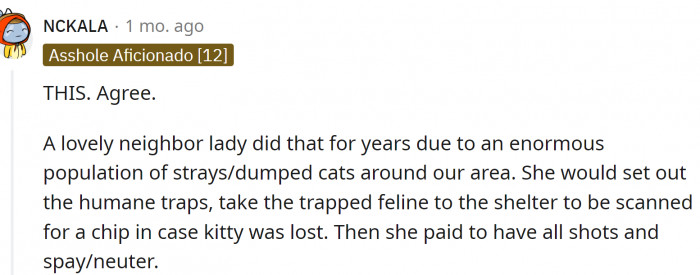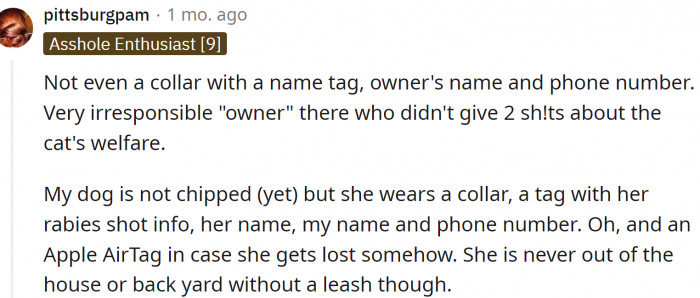Good Samaritan Neuters A Presumed Stray Cat That Turns Out Not To Be Stray At All
You're coming back from the store with your bags full of items you didn't even plan to buy. And you meet someone you didn't plan to meet.
You pause and linger your gaze on this adorable stray cat. You say hi, it says hi, and you both go about your day.
Then you see it again the next day. And the next one.
It is hanging around the parking lot, a huge concrete slab without a tree in sight. The cat is trying to catch some shade underneath the cars, but they are also hot.
Now, cats love warmth, but this is too much, even for them. You give it water, and it happily drinks it.
And this friendship starts to bloom. You bond, and you notice that the cat is not neutered.
This leads you to the conclusion that it is a stray cat. As a socially responsible person, you take it to the vet and pay for a complete medical check and neutering.
Why do you do that? Well, because you are a nice person.
And you know what they say about good deeds: not one of them goes unpunished...
Just look at what happened to our OP. They posted this story on Reddit, asking, "AITA for neutering an outdoor cat?"
The Redditors were not skimpy with their answers, and we have chosen some of the most interesting ones to show you.
Take a look:
OP asked:

OP lives in an apartment complex that has a large parking lot. They noticed a nice cat hanging around and started giving it water to help it cope with the heat. They also noticed that the cat wasn't fixed, which led them to the conclusion that it was a stray.

OP lured the cat with some food, trapped it, and took it to the vet. The vet spayed it and gave it a vaccine and deworming medicine. All in all, OP paid $120 out of their pocket.

The Psychology of Altruism
When individuals encounter a situation that calls for altruistic behavior, such as helping a stray animal, various psychological factors come into play. Research on altruism suggests that empathic concern often drives prosocial behavior; when we perceive a being in distress, we instinctively feel an urge to help. Dr. Sonja Lyubomirsky, a happiness researcher, states, "Empathy is a crucial component of our social fabric, and it can be cultivated through our experiences and values." This empathy can be heightened by personal experiences or cultural values that emphasize the importance of caring for others, as noted on her professional website sonjalyubomirsky.com.
This suggests that understanding the underlying motivations for altruistic acts can enhance community engagement and support for vulnerable populations, including stray animals. Furthermore, developing empathy through educational initiatives could foster a culture of compassion towards animals and promote responsible pet ownership.
OP didn't have the means to properly take care of the cat, so they decided to take it to a shelter. Then they found out the cat has an owner.

The owner was pretty angry and accused OP of stealing the cat.

OP thinks that this is not their fault, but still wants to make sure.

From a behavioral psychology standpoint, the act of neutering a presumed stray cat can also be seen through the lens of the 'bystander effect.' This phenomenon, described by social psychologists Bibb Latané and John Darley, indicates that individuals are less likely to offer help in emergencies when other people are present. The initial impulse to act may diminish if one believes someone else will step in. In the context of animals, this could mean that people may notice stray cats but hesitate to intervene, thinking others might already be caring for them.
Encouraging community involvement and building awareness about the importance of animal welfare can counteract this bystander effect. Educational campaigns can help individuals understand that their actions matter and that collective efforts can significantly improve the lives of stray animals.
Redditors believe OP did the right thing

Other people do the same

We don't need more stray kittens

Understanding Responsibility in Animal Care
While the intention behind neutering a cat may stem from a desire to help, it raises essential questions about responsibility and ownership. According to Dr. John McCarthy, a veterinary behaviorist, many individuals often struggle with the concept of responsibility when it comes to animal welfare. Research shows that people may feel a sense of obligation to care for animals they perceive as vulnerable, but this can sometimes lead to misguided decisions, such as neutering without consent from the actual owner.
Moreover, the concept of 'cognitive dissonance' plays a role here; when people act in ways that conflict with their values or beliefs, they experience psychological discomfort. Acknowledging this tension may motivate individuals to seek more informed approaches to animal care, such as consulting with local shelters or veterinarians before taking action.
The cat wasn't chipped and didn't have a collar... That's one very irresponsible cat owner.

Other people would assume the same

"This cat I call mine but have never taken responsibility for..."

Behavioral economics sheds light on the decision-making processes surrounding animal care. The principle of 'loss aversion' indicates that individuals often prefer to avoid losses rather than pursue equivalent gains, which can affect their willingness to neuter stray animals. As Dr. Susan David, an expert in emotional agility, states, "People often resist change due to the fear of losing something familiar, even when the benefits are clear." This hesitation can stem from the perceived loss of an animal's natural reproductive capabilities, despite an understanding of the advantages of population control. To counter this, community outreach programs can highlight the long-term benefits of neutering for both the animals and the community, effectively reframing the decision as a gain rather than a loss. By sharing statistics and success stories from similar communities, these initiatives can help shift perspectives and foster greater involvement in animal welfare.
Redditors shared their experiences:

There are not many reasons for breeding cats

The bottom line is - OP should have zero regrets

The Importance of Community Engagement
Community engagement plays a pivotal role in addressing the welfare of stray animals. Research indicates that when communities collectively work towards a common goal, such as improving the lives of stray animals, they can create a supportive environment that benefits everyone involved. Group dynamics, as explored in studies by social psychologists, show that individuals are more likely to participate in altruistic behavior when they perceive a shared responsibility.
To foster this collaborative spirit, community workshops or volunteer programs focused on animal welfare can be invaluable. Not only do these initiatives educate participants about responsible pet ownership, but they also cultivate a sense of belonging and shared purpose among community members, enhancing both individual and collective well-being.
Although neutering may seem cruel, it is the best way to prevent cats from having unwanted kittens that would end up as strays. The need for a male cat to explore or defend its territory lessens, and so does the desire to urinate in public (thankfully).
The vast majority of cat owners claim that after neutering, their pets become calmer. Don't worry; neutering won't make your cat dislike you or make them less affectionate toward you.
Psychological Analysis
This scenario illustrates a fascinating mix of empathy and the challenges of responsibility. The good Samaritan's desire to help the presumed stray cat reflects a strong empathic concern, which can often propel individuals to act, even if it means making potentially controversial decisions like neutering. However, this situation also highlights the need for better awareness of responsible pet ownership—it's a reminder that good intentions can sometimes lead to misunderstandings, especially when ownership isn't clearly established.
Analysis generated by AI
The interaction between human behavior and animal welfare highlights the complexities of altruism, responsibility, and community dynamics. Research consistently underscores the importance of empathy and informed decision-making in fostering positive outcomes for vulnerable populations, including animals. As we navigate these moral landscapes, it's crucial to remember that effective solutions often lie in community collaboration and education.
Ultimately, by understanding the psychological principles that govern our decisions and actions, we can better equip ourselves to make compassionate choices that benefit both our communities and the animals within them.



